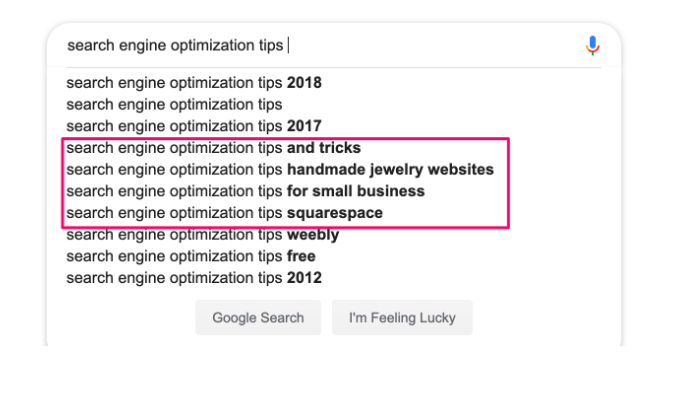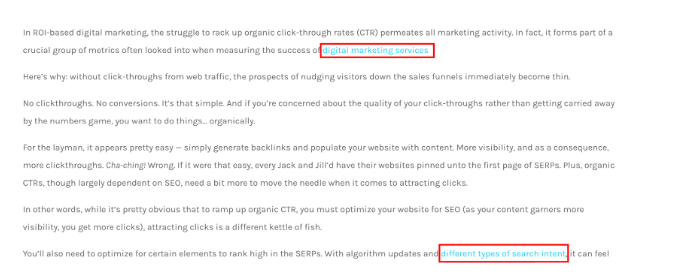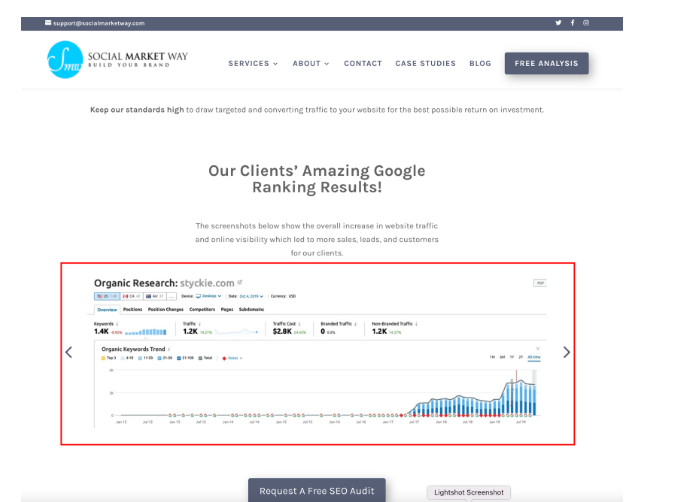10 Ways to Increase Organic Traffic to Your Website

Yassin Aberra
I live and breathe Digital Marketing.
10 Ways to Increase Organic Traffic to Your Website
“Of course, I want to ramp up traffic to my website, and I want it done organically,” you mutter to yourself as you scrounge up another huge marketing budget for the new year. If paid traffic is likely to cause a dent on your wallet, there’s good news: organic traffic. Did you know that by increasing organic traffic, you can increase your chances of appearing on the first page of search engine results, making it easier for potential leads to pass through your sales pipeline? Increasing organic traffic helps improve your conversion rates and sales. As more people visit your website and engage with your content, you can build relationships with potential customers and convert them into paying customers, growing your bottom line. Seeking how to increase organic traffic to your website? You’re at the right stop. A quick glance at a few other articles on the blog reveals some of these strategies. Some, familiar. Others? Totally new. Across the board, they share one thing in common: they’re proven. So, without further ado, here are 10 ways to increase organic traffic to your website.
How to increase organic traffic to your website
As a preliminary issue, organic traffic is not to be mistaken for direct traffic. Direct traffic is any type of website visitor that arrives at a website by directly typing in the URL into their browser, or clicking on a link from an email or document. On the other hand, organic traffic is visitors that find your website after using a search engine like Google and other unpaid channels (as opposed to paid ads). Here’re some of the top ways to drive organic traffic to your website:
-
Search Engine Optimization (SEO)
Since search engines rely on keywords to identify which pages are most relevant to a topic, SEO is the first step to creating a lasting pipeline for organic traffic to your website. After identifying keywords, they rank pages on the search engine result pages (SERPs) based on the perceived degree of relevance. And, of course, the higher a site ranks on the SERP, the higher its chances of seeing improved organic search traffic. This means ensuring that your website is properly indexed and that your pages are properly optimized with relevant keywords and meta descriptions. However, you must know that it is detrimental to oversaturate your website with keywords. The search engines are also trained to de-rank websites that try to game the system by oversaturating content with keywords. It’s advisable to keep keyword density at just around 2%. While the use of SEO itself is entirely free, you can hire a professional SEO company to guide you to the process. It would be an investment that will pay off in spades.
-
Focus on long-tail keywords
 It’s not just enough that you insert keywords in your web content. Remember that the ultimate goal with keywords is for your website to be regarded as relevant to the topic by the search engines. To that end, long-tail keywords (keywords usually longer than just one or two words) are much better for SEO optimization. They are more specific and indicate relevance better than single random words. For example, for a travel agency, a long-tail keyword like “cheap airline tickets to Bali” would make far more sense than just “airline”, or “tickets” positioned randomly. Long-tail keywords are less commonly searched for but are still highly valuable. By targeting long-tail keywords, you can attract more qualified, specific traffic to your website.
It’s not just enough that you insert keywords in your web content. Remember that the ultimate goal with keywords is for your website to be regarded as relevant to the topic by the search engines. To that end, long-tail keywords (keywords usually longer than just one or two words) are much better for SEO optimization. They are more specific and indicate relevance better than single random words. For example, for a travel agency, a long-tail keyword like “cheap airline tickets to Bali” would make far more sense than just “airline”, or “tickets” positioned randomly. Long-tail keywords are less commonly searched for but are still highly valuable. By targeting long-tail keywords, you can attract more qualified, specific traffic to your website.
-
Create high-quality, valuable content
Another important strategy for increasing organic website traffic is to consistently publish high-quality, valuable content on your website. Users are constantly searching for content online to answer questions that they may have. Creating content that establishes you as a thought leader in your niche is definitely a surefire way to create a lasting organic traffic pipeline. Online content could include blog posts, articles, videos, infographics, or other types of content that provide value to your audience. Besides, the more valuable and engaging your content is, the more likely it is to be shared and linked to, which can help drive even more traffic to your website.
-
Leverage social media
 Social media platforms can be a powerful tool for driving traffic to your website. By regularly sharing your content on social media and engaging with your followers, you can increase the visibility of your website and attract more organic traffic. You could start by simply sharing some content from your website. However, you should expect that an approach like that would have low conversion rates. With attention spans at an all-time low, users on Twitter, for example, will likely not want to pause scrolling to read a long-form article. What will work best is direct engagement on social media. Join in conversations, share short helpful tips and infographics, and most importantly, be fun. The image above is a tweet from Ryan Air, joining in on World Cup fun. However, if you choose to follow this path, it is important that you should be aware of and understand sensitivities. You don’t want to find your business on the receiving end of negative attention on social media, just because you tweeted something seemingly harmless that turned out to be incredibly insensitive.
Social media platforms can be a powerful tool for driving traffic to your website. By regularly sharing your content on social media and engaging with your followers, you can increase the visibility of your website and attract more organic traffic. You could start by simply sharing some content from your website. However, you should expect that an approach like that would have low conversion rates. With attention spans at an all-time low, users on Twitter, for example, will likely not want to pause scrolling to read a long-form article. What will work best is direct engagement on social media. Join in conversations, share short helpful tips and infographics, and most importantly, be fun. The image above is a tweet from Ryan Air, joining in on World Cup fun. However, if you choose to follow this path, it is important that you should be aware of and understand sensitivities. You don’t want to find your business on the receiving end of negative attention on social media, just because you tweeted something seemingly harmless that turned out to be incredibly insensitive.
-
Use internal linking
 Any SEO expert who knows their onions will tell you that internal linking, which is the practice of linking to other pages on your website from within your own content, is sacrosanct for improving your website’s SEO optimization and, by extension, organic traffic. Interlinking helps improve user experience by enabling them to find resources faster and easier than having to search all over again. And remember, we already know that search engines are trained to look out for value and relevance. Internal links are one surefire way to portray that to the search engines and improve your site’s ranking on the SERPs.
Any SEO expert who knows their onions will tell you that internal linking, which is the practice of linking to other pages on your website from within your own content, is sacrosanct for improving your website’s SEO optimization and, by extension, organic traffic. Interlinking helps improve user experience by enabling them to find resources faster and easier than having to search all over again. And remember, we already know that search engines are trained to look out for value and relevance. Internal links are one surefire way to portray that to the search engines and improve your site’s ranking on the SERPs.
-
Promote your content through email marketing
Email marketing still retains its status as a key driver of customer acquisition and retention for both small and midsize businesses. According to this Emarsys study, 81% of Small and medium-scale businesses have email marketing as their primary source of acquiring customers, while 80% of them use this channel to retain customers. While Email marketing takes the cake for customer relationships, it can also be a medium for driving traffic to different pages on your website or blog, giving readers more opportunities to discover what you have to offer. By regularly sending newsletters or other types of email communications to subscribers, you may build a healthy community of people who’re interested in what you have to say about topics in your niche. This audience, if properly handled, can become a reliable reservoir of potential visitors to your websites; or even eventually paid users. After all, the email subscriber-to-paid user pipeline is time-tested and well-recognized.
-
Collaborate with other websites and bloggers
Collaborating with other websites and bloggers in your industry can be a great way to increase the visibility of your website and attract more organic traffic. This could include guest blogging, cross-promotion, or other types of partnerships. Writing guest posts for other websites is a great collaborative way to increase your own website’s visibility. Not only will you get exposure from the website itself, but readers of the post are also likely to check out your website afterward.
-
Monitor and analyze your traffic
 To effectively increase organic traffic to your website, it’s important to monitor and analyze your traffic data. Monitoring and analyzing your web traffic can help you understand how users interact with your website, which can help you identify potential problems or areas for improvement. This information can be valuable for a variety of purposes, including identifying trends or patterns in user behavior, determining the effectiveness of marketing campaigns, and identifying potential security threats. By analyzing your web traffic, you can gain valuable insights that can help you improve the user experience on your website and make more informed decisions about how to improve your online presence.
To effectively increase organic traffic to your website, it’s important to monitor and analyze your traffic data. Monitoring and analyzing your web traffic can help you understand how users interact with your website, which can help you identify potential problems or areas for improvement. This information can be valuable for a variety of purposes, including identifying trends or patterns in user behavior, determining the effectiveness of marketing campaigns, and identifying potential security threats. By analyzing your web traffic, you can gain valuable insights that can help you improve the user experience on your website and make more informed decisions about how to improve your online presence.
-
Keep your website up-to-date
To keep your website up-to-date, you should regularly review and update the content and fix broken links on your website to ensure that it remains accurate and relevant. You should also update any plugins, themes, or other third-party tools you use on your website to ensure that they are secure and functioning properly. Additionally, you should regularly back up your website to protect against data loss and ensure that you can recover your website in the event of any unforeseen issues. Finally, you should consider implementing a content management system (CMS) to make it easier to manage and update your website.
-
See out what your competitors are up to
Another effective way to increase website traffic is to conduct competitor analysis. By using tools like Semrush, Sprout Social, and Ahrefs, you can gain insight into the strategies your competitors are using to drive organic search traffic to their sites. Using this information, you can improve and finetune your traffic generation efforts. Additionally, monitoring your competitors’ activities can help you identify market gaps and growth opportunities. By staying up-to-date on industry trends and the latest marketing techniques, you can develop a comprehensive traffic generation strategy that sets your site apart from the competition.
Wrap Up
By staying up-to-date on industry trends and the latest marketing techniques, you can develop a comprehensive traffic generation strategy to help your site stand out from the competition. It’s vital to treat traffic generation with the seriousness it demands, as visitors from your web traffic, when converted into leads, can become loyal customers that generate revenue. Whether it’s with SEO, blogging, social media, or other digital marketing forms, your strategy is well off with experts on board to get the best results. Sounds like a plan? Why don’t you get in touch with us today? Let us get your website to the top of the SERPs where it belongs.
